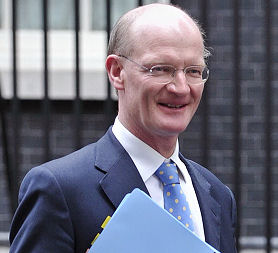Tuition fees: university minister v 6th form blogger
Universities Minister David Willetts answers a plea from our Young Blogger of the Year, setting out the government’s case in the debate over student fees.

I’m pleased to have this chance to reply to Louise and – hopefully – to allay some of her concerns. But first, I do recommend that she looks at Ed’s response to her blog (at 2.50pm on October 26th), because he is pretty much spot on.
Ed correctly points out that no students will have to pay a penny towards the cost of their tuition until after they graduate and are earning a decent income. Lord Browne has recommended a minimum annual salary of £21,000 before repayments start.
Ed is also right about graduate contributions being very different to mortgages or credit cards. The government cannot “call in” the loan, and will write off outstanding money after a certain period.
If Louise eventually becomes a successful journalist on a national newspaper, she will repay her loans out of her wages at a higher rate of interest than someone on a lower income.
But if she herself decides to pursue a less well-paid job – or takes a career break – her repayments will fall or stop completely. They are linked, in other words, to what graduates can afford.
Louise's blog: University fees - Give us a chance, Mr Cameron
I didn't even want to go to Uni. I hated school and wanted out at the very first opportunity. Uni was for posh, smart people who wanted to be doctors, in my view, and all I wanted was a nice job with the GCSEs I was attempting to get. But I was ignorant and thought I knew it all then. Now I really do want to go to a Uni in London to study journalism. I have goals now. I knew it would cost a lot to go, but the result at the end would hopefully make it worth it. Now I’m not so sure.
Read Louise's full blog
Loans to cover tuition fees are not the only aspect of government support for people at university. Depending on your family’s income, there are maintenance grants to cover your living costs. Again, we are considering Lord Browne’s recommendation to increase these grants for students from poorer families.
We will also be introducing a new national scholarship scheme to support young people from the most deprived backgrounds to benefit from the university experience.
In her blog, Louise writes about the prospect of universities raising the costs of degree courses. This is likely to happen, but I can assure her that universities who charge more will be required to show how any increased costs will benefit their students. This might involve greater financial support for poorer students or a greater emphasis on preparing students for jobs after university.
Under all circumstances, applicants to university have a right to know what they are paying for and what they can expect from the institution they attend. Universities will have to provide more information on things like course content, contact time with lecturers and the proportion of graduates who go on to decent jobs.
For teenagers still at school or college, the government will improve the information and advice available so that they can make the right choices about their futures – and at the right time. Somebody who wants to become a journalist or an engineer, for example, needs to know what A levels to study, and which universities have the best reputations in those subjects.

Louise is absolutely right that university is not for everyone, though I would not recommend that any young person relies on GCSEs alone to get through life. Further qualifications are the key to securing an interesting and rewarding job.
The fundamental point is that universities are not the only place to get highly-valued qualifications, which is why this Government is so keen on creating more apprenticeships. For plenty of people, apprenticeships and other sort of vocational qualification make more sense than an undergraduate degree.
I’d like to pick up on one final issue that Louise has raised: that teenagers represent the future of this country. I could not agree with her more, and it’s perfectly natural for young people to be anxious about the prospect of repaying substantial student loans.
All the same, this government is taking the right steps to build a bright future for the current crop of teenagers: by supporting them financially through university; by reducing the national debt which they do not deserve to be saddled with; and by creating the conditions for economic growth which lead to decent jobs.
I wish Louise the very best of luck.
David Willetts
Minister for Universities and Science
-
Latest news
-
‘Authentic Stupidity’: Ben Elton’s new show explores how idiotic human beings can be5m

-
Is Israel’s evacuation of Rafah the precursor to full scale invasion?3m

-
Eurovision: Non-binary artist wins for first time2m

-
Tens of thousands march in Georgian capital against ‘foreign agents’ bill2m

-
‘Russia’s number one goal is to get troops closer to Kharkiv,’ says Ukrainian security analyst4m

-




